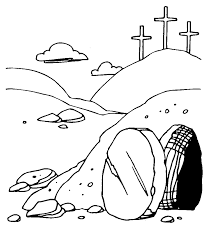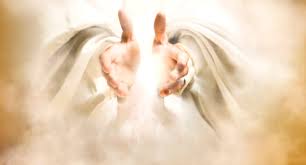John 19:31 – Since it was the day of Preparation, and so that the bodies would not remain on the cross on the Sabbath (for that Sabbath was a high day), the Jews asked Pilate that their legs might be broken and that they might be taken away.

We ended our last post as Jesus declared his work was finished; he committed his spirit into the hands of the Father.
Meanwhile, here on earth, the Jews approached Pilate with yet another request. The next day was considered a 'high day' for several reasons.
- It was the second day of the Feast of Unleavened bread which was occurring on the weekly Sabbath day.
- It was the day in which the sheaf of the first-fruits was offered to God (Leviticus 23:10-11).
- It was one of the feasts at which ALL Jewish males were required to appear before the Lord at the temple (Exodus 23:17).
For these reasons, the Jews considered it a day of immense sacredness and solemnity; a 'high' holy day.
The law declared that bodies hung on a tree should be buried before nightfall (Deuteronomy 21:22-23) or else the land would be polluted in the sight of God. Back in that day people weren't crucified, but they were sometimes impaled or 'suspended'. In such cases, death occurred very quickly. We also find that sometimes dead bodies were publicly displayed for a time. In either case, it wasn't a real problem to bury the body before dark.
But when the Romans invented crucifixion, that all changed. They were so good at torturing people, that the condemned often lived between four and seven days on the cross before expiring.

Breaking the legs of the condemned while they were suspended on the cross not only increased their pain and suffering, it further injured the body and deprived it of any support from the feet. Thus, all the weight of the person was now shifted to the arms/hands. Apparently, it was often enough of a stress to significantly hasten death, which is why the Jewish leaders were requesting that it be done.
Again, we can't help but notice that the religious leaders did everything in their power to keep the smallest commandment of the Law, despite the fact that they had just demanded the murder of an innocent man – the Son of God!
Now, what we are about to see in the next few verses are multiple confirmations of the death of Jesus:
The Jews: For their part, the Jews request that the legs of all prisoners be broken, so they would die and be buried before the high holy day. (After all, they didn't want their cherished religious celebrations to be tarnished with the death of the Messiah.) Because of their request, the soldiers took special note that Jesus was already dead and it would not be necessary to break his legs.
Pilate: The only person who could order the legs broken and the only person who could authorize removal of a body from a cross was the governor. This makes sense; if it took seven days for someone to die from this torture, it would theoretically be possible for them to survive the ordeal if they were removed from the cross early. However, we can be sure that Pilate did not allow this to happen.
Scripture reveals that once Joseph comes forward to claim the body of Jesus, Pilate stops to consult with the centurion in charge of the execution. He requests verification that Jesus is really dead (Mark 15:43-45) before he rules on Joseph's request.
John 19:32-33 – So the soldiers came and broke the legs of the first, and of the other who had been crucified with him. But when they came to Jesus and saw that he was already dead, they did not break his legs.
The Roman soldiers: Here we find confirmation of the death of Jesus by those who actually carried out the death sentence. The soldiers performed numerous executions; they had no difficulty verifying that Jesus was dead. If he hadn't been, they would certainly have broken Jesus' legs just as they did the legs of the two robbers, because from their point of view, the sooner the prisoner died, the sooner their work was done. Based on their actions we can be sure that Jesus was dead.
John 19:34 – But one of the soldiers pierced his side with a spear, and at once there came out blood and water.
This is further testimony of the death of Jesus by the Roman soldiers. Jesus had died much quicker than expected, so just for good measure, one of the men thrust a spear or lance into the side of Jesus and up into his heart.
 This released the water in the sac around his heart, and it drained any remaining blood contained in the heart, thus confirming again that Jesus was really dead. It also explains the presence of both blood and water flowing from the body.
This released the water in the sac around his heart, and it drained any remaining blood contained in the heart, thus confirming again that Jesus was really dead. It also explains the presence of both blood and water flowing from the body.The actions that occurred here bore further testimony that Jesus was the Messiah.
According to the instructions for the very first Passover meal/sacrifice (when the Hebrews were exiting Egypt), God was very specific that no bones of the lamb could be broken (Exodus 12:46, Numbers 9:12, Psalms 34:20). This instruction was observed from the very first Passover in Egypt, up to and including the death of the true Passover lamb – Jesus.
The prophet Zechariah also notes that the events of the crucifixion provide further proof that Jesus was the Messiah:
Zechariah 12:10 - And I will pour upon the house of David, and upon the inhabitants of Jerusalem, the Spirit of grace and of supplications: and they shall look upon me whom they have pierced.
This prophesy has multiple layers of fulfillment.
- Some of the Jews saw the body of Jesus on that day (John, Nicodemus, Joseph of Arimathea, etc) and noted that it was pierced.
- Later on, the apostle Thomas had a chance to put his hand into the wound located in the side of Jesus (John 20:25-27). It was clear he had been pierced.
- At some time in the future, the entire nation of Israel will recognize Jesus as the Messiah, based on the scars of his crucifixion.
As conclusive as this evidence was/is, God gave even more proof that Jesus was actually dead:
John 19:35-37 – He who saw it has borne witness – his testimony his testimony is true, and he knows that he is telling the truth – that you also may believe. For these things took place that the Scripture might be fulfilled: "Not one of his bones will be broken." And again another Scripture says, "They will look on him whom they have pierced."
John: Finally we come to the eye witness proof of the apostle John. We know John was present during the crucifixion, since Jesus spoke to him from the cross, giving him instructions to take care of his mother.
Since Jesus died quickly (in a matter of hours), John would have still been around when the soldiers were commanded to hasten the death of the condemned by breaking their legs. He was an eye witness to the soldier piercing the side of Jesus.
We now have five different proofs or testimonies that Jesus is dead. There is no way that anyone (then or now) can plant seeds of doubt in the minds of people about this fact. The resurrection was not a trick or a farce. It was a real event.
I want to make one point of clarification regarding this discussion. I have used the phrase 'Jesus died quickly' and made other remarks that state the same thing. This phraseology is just for the sake of clarity. In truth, we know that Jesus did not simply die when his body gave out. He died sooner than normal because he was in control of the situation; not nature. When the price of sin had been fully paid and the wrath of God fully satisfied, he knowingly and willingly gave up his spirit to the Father. As a result, his body died.
In so doing, Jesus became the true fulfillment of the Passover; he is the innocent lamb that was sacrificed for the sin of the world (I Corinthians 5:7).
John 19:38-39 – After these things Joseph of Arimathea, who was a disciple of Jesus, but secretly for fear of the Jews, asked Pilate that he might take away the body of Jesus, and Pilate gave him permission. So he came and took away his body. Nicodemus also, who earlier had come to Jesus by night, came bringing a mixture of myrrh and aloes, about seventy-five pounds in weight.
Having firmly established that Jesus was indeed dead, John now gives us an account of his burial.

As we already mentioned, the bodies of executed prisoners were under the authority of the Roman governor and they could only be claimed with his permission. Pilate gave that permission to Joseph of Arimathea.
The gospel of Matthew tells us that Joseph was a rich man (Matthew 27:57), while Luke informs us he was a counselor or senator (Luke 23:50), who was earnestly expecting/looking for the kingdom of God (Mark 15:43). Because of his position, he would have known or been acquainted with Pilate.
In contrast to the bullying, arrogant attitude of the Jewish leaders, Joseph approaches Pilate humbly or perhaps professionally and requests the body of Jesus.
This must have been quite a testimony to Pilate. He knew the Jewish leaders as envious, self-important hypocrites and he probably thought all the Jews were the same. But here comes Joseph - an intelligent, honest, well respected public figure who reveals that he too is a follower of the Jewish religion. What's more, Joseph clearly believed in Jesus as the Messiah. At the very least, it gave Pilate something to think about.
It appears that Joseph was aided in the burial by Nicodemus, a Pharisee and leader of Israel who met Jesus by night (John 31:1-2). He held an honorable position among the Jews and like most other Pharisees, he too was a wealthy man.
Both of these men were believers in Jesus. Although they kept their faith away from the world, they were not ashamed or afraid to claim the body of Jesus after his disciples had hidden themselves away in fear and grief.
For these two men, it was the death of Jesus which caused their faith to blossom. Suddenly, they are no longer afraid of their fellow Jews. Suddenly, they are willing to risk the loss of their wealth and positions in society in order to claim Christ. Perhaps they were put on earth specifically for that time!
John 19:40 – So they took the body of Jesus and bound it in linen cloths with the spices, as is the burial custom of the Jews.
The Jews typically embalmed their dead with a mixture of myrrh, aloes and other spices which they rubbed on the body. More wealth or honor in life meant more spices during death.
After the body was anointed it was covered with a shroud and a separate napkin was placed around the head and face. Finally, strips of linen were used to tightly wrap the shroud around the body. In some cases, if finances permitted it, the entire grave was filled with spices and the body laid on top of them.
Isaiah 53:9 - And he made his grave with the wicked, and with the rich in his death; because he had done no violence, neither was any deceit in his mouth.
Judging by the amount of spices used by Nicodemus (75 pounds), it is evident that the body of Jesus was treated with the respect of a rich and honorable man. Besides being anointed and laid in spice, Jesus was placed into a brand new tomb created and reserved for a rich and honored member of society. His entire burial was one that reflected wealth, prestige and honor, as predicted hundreds of years before by the prophet Isaiah.
John 19:41-42 – Now in the place where he was crucified there was a garden, and in the garden a new tomb in which no one had yet been laid. So because of the Jewish day of Preparation, since the tomb was close at hand, they laid Jesus there.
Obviously, you can't just bury a body in any tomb that happens to be empty. You either have to own the space, or have the owner's permission to use it. In this particular circumstance, it is likely that the tomb in question was actually owned by Joseph.
 He had no doubt purchased it for himself and his family, but because of the time constraints he was willing to place Jesus there. Perhaps he planned to do so when he went to ask for the body, because his new tomb was close and convenient.
He had no doubt purchased it for himself and his family, but because of the time constraints he was willing to place Jesus there. Perhaps he planned to do so when he went to ask for the body, because his new tomb was close and convenient. But you and I can see the hand of God at work in this situation.
The burial place of Jesus was not an accident or simply a convenience. Although all men (including Jesus) must die (Hebrews 9:27), Jesus was the first born from the dead and the first fruits of them that rise from the dead.
1 Corinthians 15:20-21 - But now is Christ risen from the dead, and become the first fruits of them that slept. For since by man came death, by man came also the resurrection of the dead.
(See also Colossians 1:18). As such, it was appropriate for his grave to be a new sepulcher; one which no other person had ever used.
We also note that this grave was in the midst of a garden, which again calls to mind that sin/death came into the world in a garden (Eden), but resurrection life also manifested in a garden.
Since Jesus was in the tomb alone, no one could claim that it was actually someone else who had risen that day. It prevents the false rumor that Jesus was raised by coming into contact with the bones of some prophet, like the corpse which came alive after touching the bones of Elisha (II Kings 13:21).
Scripture also reveals that the tomb was hewn out of solid rock, which means there was no secret 'back door' or other entrance through which the disciples could have removed the body.
God has set the stage to prove beyond any doubt that Jesus was resurrected from the dead! We will discuss the details of the resurrection in our next post.
Let me offer you some encouragement, relief and strength:
Every part of the death of Christ reveals the hand of God at work. Because the resurrection of Jesus was going to be so astonishing and vitally important, his death had to be documented beyond any question. God provided no less than five key individuals/groups that verified/attested to the death of Jesus.
God was also clearly at work behind the scenes as Joseph and Nicodemus oversaw the burial of Christ.
God is also at work in our lives, even though we may not realize it at the time. Sometimes we go through difficult or confusing circumstances, and it is hard to see his hand at work, but we can be encouraged, relieved and strengthened knowing that God is always in control.
- He loves us so much that he gave Jesus to die for us.
- He will never allow us to be tempted beyond what we can endure.
- He sets a table for us in the presence of our enemies.
- He works all things together for our good; even the things that Satan has meant for our destruction.
And, hallelujah, he has ordained that we too will one day be raised from the dead to live with him forever in heaven!
The Jews, the Romans and Pilate all felt that they were 'in charge' or making decisions about the death of Christ. But all of them were wrong – although they each had choices to make, God was in charge of the situation. And he is in charge of your situation too.
So no matter what you are facing today, let faith rise up within you – God is guiding you every step of the way, bringing you to victory.
